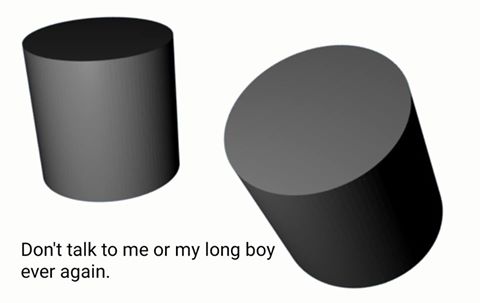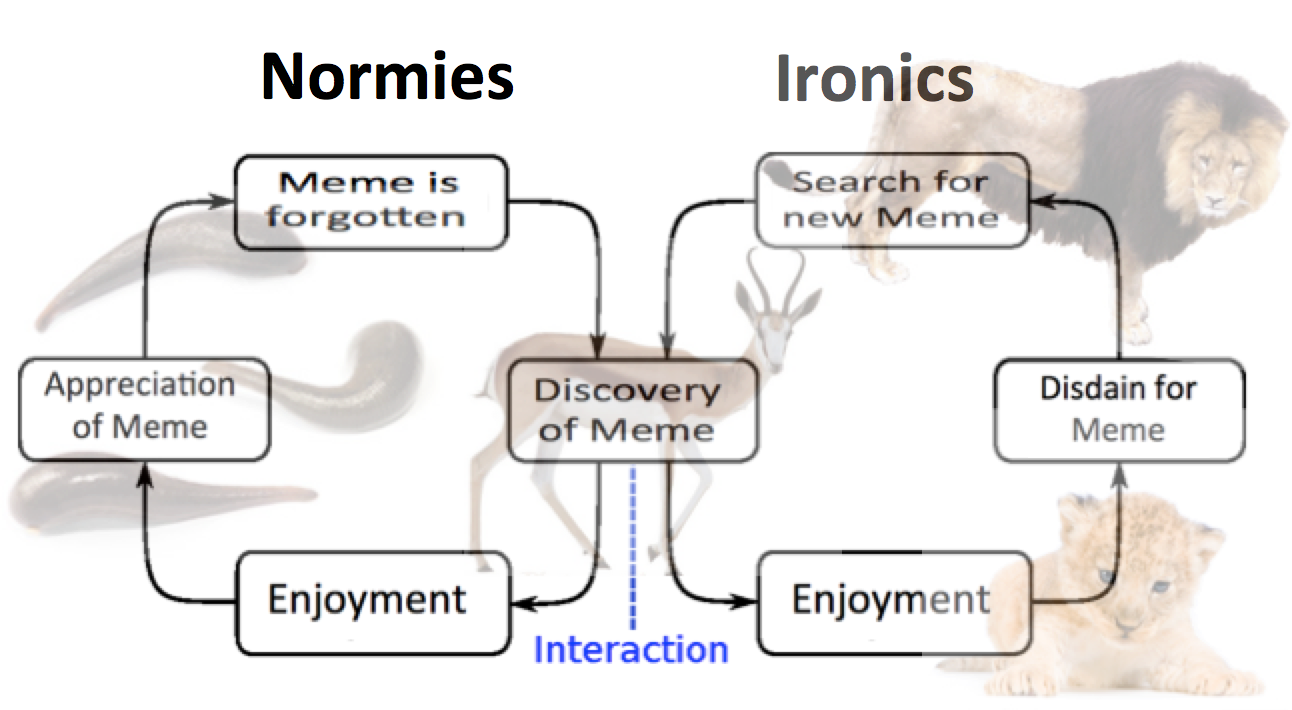long boys never grow up
Isaac van Bakel & Ulysses King1. Introduction
“Long boy” is the colloquial name for two connected memes: a way of referring to any cylinder or cylindrical object, and a specific image of an orange cylinder, based off the first meme. Both were established by a throwaway line in a Special Meme Fresh image that categorised sending images of cylinders to your friends and saying "haha long boy" as the 5th layer of irony. A combination of audience response to this line and further Special Meme Fresh posts on the same topic would serve to cement both the name and the iconic orange cylinder as the archetypal long boys.
2. Timeline and Development
The chronology of the long boy meme can be split into three large stages on the SMF timeline. Each represents a different view in the development of the meme itself and the community response to it:
The first was the genesis, beginning with the posting of the levels of irony on the 24th of February. This marked the inception of the meme, as well as its first iteration, when in the comments section of the same post someone posted an image of a cylinder along with the text "haha long boy". This comment would later gain 169 likes. SMF would continue the meme several hours later with the second seminal image, which showed the later-famous orange cylinder being sent on a mobile, followed by the message "haha long boy", met with the response of "What?".
 The second stage was the integration, wherein the long boy was used in implementations of other memes. The first, by SMF, was the "wew lad" face imposed on a cylindrical shape, with the caption "wew long lad", posted on the same day as the very first levels post. Later images would include: a "loss" made of cylinders on the 25th; "don't talk to me or my long boy ever again" on the 26th; and "i'm you but longer” on the 26th again. These three posts, combining the absurdity of the long boy with well-established meme templates, proved incredibly successful with the community, garnering 1k, 1.1k, and 1.9k reactions respectively: each was larger than the last.
The second stage was the integration, wherein the long boy was used in implementations of other memes. The first, by SMF, was the "wew lad" face imposed on a cylindrical shape, with the caption "wew long lad", posted on the same day as the very first levels post. Later images would include: a "loss" made of cylinders on the 25th; "don't talk to me or my long boy ever again" on the 26th; and "i'm you but longer” on the 26th again. These three posts, combining the absurdity of the long boy with well-established meme templates, proved incredibly successful with the community, garnering 1k, 1.1k, and 1.9k reactions respectively: each was larger than the last.
 The third is the regret stage, which can be traced to two posts on SMF made early in the morning of the 28th of February. The first, a text post, tells of the author's self-loathing after posting "The meme", which may or may not have been long boy. The second, an hour later, was a share of a user post of "for really big mistakes" with the long boy orange cylinder. While SMF would continue to make positive long boy memes for several days, this can be seen as the start of sentiments which culminated in a post on the 1st of March which damned long boy as "FINISHED / DONE". It would become clear that long boy was having an adverse effect on the admin of SMF, who received a large influx of messages of the long boy meme from page visitors. SMF effectively declared war on long boy on March 3rd, when the admin posted that anyone commenting or messaging long boy or its variations would be banned.
The third is the regret stage, which can be traced to two posts on SMF made early in the morning of the 28th of February. The first, a text post, tells of the author's self-loathing after posting "The meme", which may or may not have been long boy. The second, an hour later, was a share of a user post of "for really big mistakes" with the long boy orange cylinder. While SMF would continue to make positive long boy memes for several days, this can be seen as the start of sentiments which culminated in a post on the 1st of March which damned long boy as "FINISHED / DONE". It would become clear that long boy was having an adverse effect on the admin of SMF, who received a large influx of messages of the long boy meme from page visitors. SMF effectively declared war on long boy on March 3rd, when the admin posted that anyone commenting or messaging long boy or its variations would be banned.

3. Reaction and Analysis
To understand how Special Meme Fresh came to hate its own creation, it is important to understand the purpose of the page. As an avant-garde post-ironic meme page, SMF aims to produce original content in an ironic and highly self-referential style, often discussing the idea of "levels of irony" and using the character of the crude 3D head that is the page's mascot - itself a mockery of the busts of vaporwave fame. Evolution, innovation, and subversion, are the key components of SMF's creative ideology; repetition, so crucial to traditionalist meme propagation, has little place on the page.
3.1 Why the Long Face?
The problem with long boy, stemming from its first use in that previously-mentioned comment, is that its propagation lacked variety or imagination. At the outset, long boy was considered so post-ironic that those repeating it did so without sufficient self-reflection - its memetic reproductions were entirely sincere. The importance of the absurdity fell away to be replaced with meta-absurdity; in every iteration, the "in-joke" was jabbing the ribs and pointing out the ridiculousness of making something so random, while failing to acknowledge exactly that behaviour. In messaging long boy to SMF, users were showing their lack of connection with the page’s or the meme’s original message: cylinder is not a meme had become a meme.
Moreover, the meme authors were failing to adopt the philosophy of Special Meme Fresh that had led to their creation in the first place: nothing was subverted in constantly repeating the orange cylinder. Declaring every tube to be a long boy soon became stale; clever cultural references such as that of the Simpsons fuel rod struggled to stay afloat in an oversaturation of sameness. Long boy, from its roots in something seemingly random and non-sequitur, had become predictable and unoriginal: even The Philosopher's Meme's own "sharp boy" Pythagoras-play struggled to avoid these uncreative grooves.
In its great controversy, long boy has highlighted a major difference between Special Meme Fresh and large parts of its audience. The latter, as a growing subset of the general weird Facebook and meme communities, experiences memes in terms of running gags and cultural references - each meme is available for reuse, and is appreciated when it is applied to a new cultural context with the same method. SMF, by contrast, posts memes in a constant context with ever-developing jokes - every meme is disconnected from the one before it in all but name. For the page, nothing is as funny when said the same way twice; for the audience, everything can become funnier after the first time you say it.

3.2 The Leg Counterculture
The most significant backfire from the long boy saga has been the introduction of “leg”, a fan-submitted image of a 3D model of a leg with the word "leg" next to it in crude word-art. According to the text that accompanied its first posting, leg was intended to be a "more powerful meme" to drive out the long boy support on Special Meme Fresh; SMF has made a point of using leg as a symbol of the anti-long-boy: it is often connected to the idea of divinity or utopia.
The rise of leg with the support of the page admin can be regarded as a major counterculture within the community against the mentality that made long boy so popular - a mentality which reduced any meme to simple, repeatable soundbites, while discarding more significant meaning. The normified kultur-terror could not seize on leg in any reducible way, and to attempt to laugh at it in context would be to admit their own failure to connect with the page's originalist mentality. Instead, audience engagement has changed between the two memes, long boy's semi-mindless repetition being replaced with a deeper understanding and collaboration with the narrative of both the page itself and the cultural war it is fighting.
But leg has not been alone in its stand against the long boy machine. Other memes, including a crude lightning bolt called “crackler”, have been incorporated into the page’s constantly-evolving narrative of purification and progression; these largely occupy the same niche as leg, representing the new and fresh ideas, applied in innovative ways, to drive away any traces of unoriginality. Each, in evidence of its message, appears totally disconnected from its counterparts, yet this has not prevented the page from including them in various unified displays of supremacy over the baser long boy.

4. Significance For The World
The long boy/leg dynamic, and the struggle of the artist against the audience for meaning and significance, are not restricted to Special Meme Fresh and this memetic cylinder. Rather, they reflect a growing issue within the post-ironic sphere: a community trying desperately to cope with the influx of members from the mainstream that comes with increased exposure. Recent media interest has only served to accelerate the process of normification that continues to affect post-ironic content creators; long boy is the symptom, not the cause, of the schism between SMF and its audience. This rapid demographic change has been so silent as to surprise even creators themselves, who cannot anticipate the undetected shift in consumer attitude until it makes itself known, forcefully, in a snap ideological conflict.

Few of the current memetic methods employed by the normie have adapted to truly synergise with what is ultimately a media-form that eschews repetition. Post-irony has excelled in the simple share, which lacks any engagement with its content, but it cannot be similarly applied to other common channels for social flow. The depth and context involved in a joke are not easily separable from any of its physical or digital components, which travel best from mouth to mouth or screen to screen. Long boy had humour at its conception, perhaps, but what survived and evolved did not carry with it all that contributed to the original joke; the pathogen, that transportable version, was simpler in assumption and meaning. The development of such a compressible meme favoured the normie, who was used to regurgitation and instant recognition - not so the ironic, who sought for originality and flavour.
What long boy tells us is something deeply important about ourselves, and to some it might be uncomfortable - the community is not quite ready for post-irony. The audience that consumes the content will never be exactly the audience that the content is produced for; the difference can be mitigated by small communities and insular policy, but it cannot be erased. The post-memetic society is loath to relinquish the crude tools that have brought it this far, in the punchline and the catchphrase, but it must accept that it can build better ones; otherwise, we will forever fail to get the joke, constantly grasping for familiar handles that are never there, until we chance on something recognisable, and in the process destroy it. Long boy is unsalvageable, but its lessons may be learnt: memes are rifles, not crutches. Stand on your own two damn leg.
INTERVIEW WITH SPECIAL MEME FRESH
Author’s note: the following interview does not indicate the interviewee’s agreement with the totality of the above article. It has been used in reference in the previous piece of writing, and is supplied separately here. We are very grateful for the help that Special Meme Fresh provided in the creation of this article.
ULYSSES: Hey, I'm with The Philosopher's Meme! I was told Isaac had floated the idea by you for a quick interview for use in an article?
SPECIAL MEME FRESH: Hi, yeah that's right
U: Awesome, is now a good time? I have a few questions about Long Boy. It's a meme that really caught our attention.
SMF: Yeah now is ok. It might take longer than usual to respond since page messages don't update automatically and I have to refresh the page or whatever though
U: That's absolutely fine! Let's get started then, shall we?
SMF: Sure
U: When was the 'long boy' meme first conceived, and to what end? I recall that it was part of a list posted to your tumblr, not even itself the object of the joke but rather a facet of the post - at least that's the first instance of the meme I encountered.
SMF: Yeah that was the start of it, the post being an explanation of the ascending Levels Of Irony and what would happen on each level. Just an offhand joke really, demonstrating the kind of absurd person you might be at that level.
U: And other people latched onto that part of the joke, apparently. Why do you think that was? Because it was easily replicated?
SMF: I don't think people latched onto it until someone had the idea to actually do it themselves and submit the pic to the page, then it took off as a separate thing. After that though you're probably right, it's pretty easily replicated, as well as the phrase itself being quite spammable/permutable.
U: Yeah, absolutely. When did you first feel that Long Boy had negatively affected the page audience?
SMF: I guess when I woke up and had about 30 page messages of "haha long boy", as well as all the comments, then I knew the meme had gone horribly wrong. At least in terms of what I like the page to be, which is a place to foster originality and interaction in the meme world. That was just before I started banning the long boys.
U: Do you regret making the meme-posts you did which featured Long Boy (i.e. the Loss comic, don't talk to me or my long boy, etc), after seeing how they were taken by the community?
SMF: Nah, it was pretty funny, and in the end it turned into an opportunity to create another layer to things.
U: Was your continuation of Long Boy based off its popularity in the comments/fanbase, or did you really make that decision on your own? I mean, we never decide what to post in a vacuum, but was it a stylistic choice or more a way to engage fans that had found something they liked?
SMF: Generally i'll just only make or post things if I find them funny at the time, so I suppose the relatively short time until I got sick of it is indicative of how quickly a fanbase can make something feel stale. If anything the fanbase is why I stopped posting it. Well, I still haven't stopped posting it, but now it's anti long boy memes and meta long boy memes.
U: Did the fan response surprise you, and did you learn something about your audience that you didn't already know based on that response?
SMF: I definitely didn't foresee it taking off. I guess I was surprised at the level of regurgitation and lack of creativity from most of the fans, that'd be why I starting purging it.
U: That sort of answers another question I had: whether you thought there was a way of using Long Boy that wasn't 'bad'. Do you think there's a risk of the same thing happening to leg, and if so how are are you acting to avoid it, and if not how much do you think that's due to leg's design?
SMF: Well, I only ever started banning comments that were just "haha long boy". Other stuff is still fine even now. Really leg only exists as an anti-meme to longboy and doesn't have much "viral potential" (or really... any potential) so I doubt anything similar would happen. Regardless, I would never raise a hand against Leg. He is a sweet boy.
U: What makes you say leg has no potential?
SMF: I suppose I shouldn't say that after cylinders just became a meme.
U: Hahaha. Just a couple more questions. I wanted to ask what you thought about the popularization of post-irony, thus far? Do you think the mainstream representation has damaged its image and how people tend to 'get' it?
SMF: I think the most recent one with the article on nymag painted quite an absurd picture of it, as if it's some kind of social-justice community. Though I don't know how articles like that affect anything. Presumably the people who read them and then go and like the pages they're about are the kind of people likely to 'get it' anyway. In a wider sense though it does seem mainstream exposure is damaging to any kind of alternative humour/memes. Just look what happened to pepe.
U: I see. Do you think post-irony could be more resilient than a meme like pepe, though? It's a much broader entity, of course.
SMF: I think the less complex/ironic/in-joke it is the more it has the ability to catch on, and post-irony generally amounts to being humorous in ways that aren't accessible to people who aren't aware of such things. So yeah I think it's definitely more resilient.
U: For sure. Well, that about wraps things up. Thanks again so much for letting us do this interview, it's been really helpful!
SMF: No worries, it was interesting
